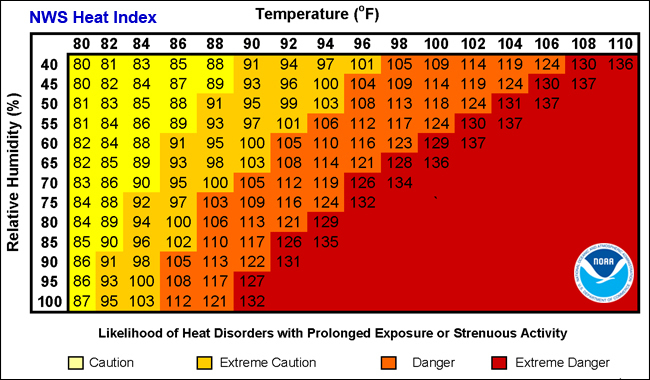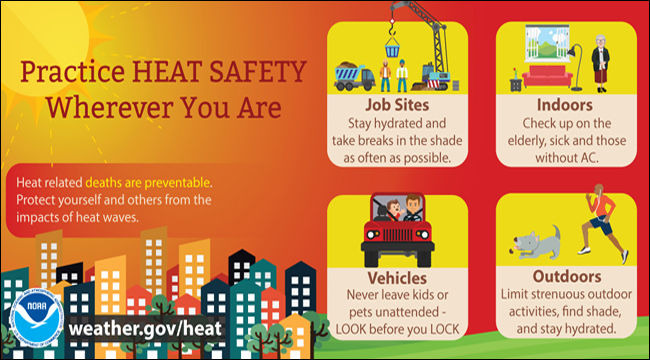Michigan Heat Awareness Day
Friday May 25 2018
| NWS Heat Safety Web Page | Heat Index Forecast |
UV Safety | Press Packet |
What exactly is a heat wave?
A heat wave is a prolonged period of excessive heat and humidity. An Excessive Heat Warning is issued if the heat index equals or exceeds 105° for at least three consecutive hours. Heat Advisories are posted when the heat index is expected to exceed 100° for three consecutive hour and can be extended into the night if low temperatures are in the 70s or higher. Excessive Heat Warnings and Heat Advisories can be issued below criteria with additional guidance or a prolonged event is occurring or forecast
What is the Heat Index?
The heat index is a measurement of how hot it really feels when the relative humidity is incorporated with the actual temperature. Heat indices were designed for use in the shade with light wind conditions. If in direct sunlight, the heat index can increase as much as 15°. With very hot and dry air, strong winds can also be extremely dangerous.

As temperatures and humidity climb, the body has to work harder to maintain a constant temperature of 98.6°. Ninety percent of the body cooling process is done by evaporation of water through the skin, or sweating. Higher relative humidity slows the evaporation rate and cooling process. Heart rates increase trying to pump more blood through the body, that in turn, evaporates more liquids from the body. When the heat gain exceeds the level of heat the body can remove, or when the body cannot compensate for fluids and salt lost through perspiration, the temperature of the body begins to rise and a heat related illness may develop.
Ranging in severity, heat disorders share one common feature: the individual has overexposed or overexercised for his/her age and physical condition.
Four types of heat disorders that occur and their symptoms include:
All heat disorders require attention, but heat stroke is a severe medical emergency and requires immediate medical attention. Any delays can result in death.
Each year, dozens of children and untold numbers of pets left in parked vehicles die from hyperthermia. Hyperthermia is an acute condition that occurs when the body absorbs more heat than it can handle. Hyperthermia can occur even on a mild day. Studies have shown that the temperature inside a parked vehicle can rapidly rise to a dangerous level for children, pets and even adults. Leaving the windows slightly open does not significantly decrease the heating rate. The effects can be more severe on children because their bodies warm at a faster rate than adults.
Following some simple safety tips can help prevent heat related problems:

Michigan averages about 5 heat related deaths each year. The number of heat related illnesses are difficult to record, but it is fair to say that each year in Michigan there are hundreds of heat related illnesses some of which require hospitalizations. The national average is 134 heat related deaths making heat the number one weather related killer in the United States.
